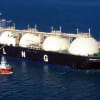Country enters LNG era
Bangladesh enters a new era in energy sector tomorrow as the first shipment of liquified natural gas (LNG) arrives at its shores.
A Floating Storage and Regasification Unit (FSRU) laden with 3,000 million cubic feet of LNG will arrive tomorrow. It can supply gas for six days at a rate of 500mmcfd, said an official of Petrobangla.
The FSRU of US-based Excelerate Energy would moor in Moheshkhali island in the Bay of Bengal, said Zanendra Nath Sarker, a joint secretary of the energy ministry. It will attach itself to an underseas structure called buoy so that it can supply gas to the mainland from 7.5km out.
The country's first LNG terminal will initially gasify the liquids and pump it into the 91km undersea pipeline linked with the grid in Anwara of Chittagong. The pipeline has already been set up by Gas Transmission Company Ltd.
Zanendra said Chittagong dwellers could be using imported gas within two weeks.
The import of LNG is part of the government's efforts to eliminate gas shortages and power outages and unlock the potential of the economy.
The imported gas will be supplied to the national grid after a 40km pipeline from Anwara to Sitakunda is ready for use, possibly in May.
The commissioning of this pipeline might be delayed. Md Quamruzzaman, managing director of Rupantarita Prakritik Gas Company Ltd, and a number of officials of Karnaphuli Gas Distribution Company Ltd, said the commissioning could be towards the end of May after dry runs.
Even if the first LNG supply goes to Chittagong, which now consumes 200mmcfd to 215mmcfd, the rest of the country will also be benefitted as gas now set aside for the port city would be freed for use elsewhere.
Bangladesh will buy LNG on its own from RasGas of Qatar under a government-to-government purchase agreement. Last year, Bangladesh signed a 15-year contract with RasGas, which would supply 2.5 million tonnes of LNG every year.
The LNG would be supplied at 12.65 percent of the three-month average price of Brent oil plus $0.50 constant per million British thermal units.
Bangladesh will be able to add another 500mmcfd if a second terminal is brought online. The facility is being developed by Summit Group, which has signed an agreement to charter one of Excelerate's FSRUs, and is expected to be online by the end of 2018 or in the first quarter of 2019.
Apart from Qatar, Bangladesh will also import LNG from Oman. A supply agreement with Oman Trading International has recently gained the government's approval.
For the first two months, the bills for the imports will be paid from the Tk 3,500-crore Gas Development Fund of the government. Later, the import will be paid from gas sales.
M Tamim, a professor of petroleum engineering department at Bangladesh University of Engineering and Technology, said there was no option for the government but to import LNG as the economy is gas-based.
He said the energy cost for energy-intensive industries would go up because of the blending of the $10 per thousand cubic metre LNG with the $3 per thousand cubic metre of local gas.
So, these industries should explore ways to increase efficiency in order to offset the energy price hike while the government could go for targeted subsidies so that the would-be-affected sectors could remain competitive, said Tamim.
Bangladesh is looking outside to alleviate its energy shortage largely caused by depleting domestic reserves and rising demand. Gas supply stands at about 2,700mmcfd against the demand for 3,300mmcfd.
The government in 2010 decided to import LNG. The import of 1,000mmcfd gas could help produce almost 5,000 megawatts of electricity, which is about half of what the country produces today.
Petrobangla estimates that the contribution of 1,000mmcfd gas to the economy would be equivalent to Tk 276,000 crore (about $34 billion). The gas would cost $3 billion and might ease the decades-long gas crisis.
As imported LNG is almost here, the issue of its impact on prices has come to the fore.
It has prompted gas suppliers to request Bangladesh Energy Regulatory Commission for fresh hikes in gas prices. They are seeking an average of 75 percent hike, from Tk 7.39 per cubic metre to Tk 12.95.
LNG might cost the country about Tk 30 per cubic metre.
The suppliers, however, are not asking for price hike of gas for cooking stoves and commercial consumers, only for industries, power stations, filling stations, fertiliser factories, and tea estates.
The commission last raised the gas prices by about 22 percent on an average in two phases, from March 1 and June 1 in 2017.
Speaking at a meeting at the Bangladesh Textille Mills Association in Dhaka, Tawfiq-e-Elahi Chowdhury, energy adviser to the prime minister, said the gas price would go up but the hike would be reasonable.
Mahbubul Alam, president of the Chittagong Chamber of Commerce and Industry, said the city was getting a supply of gas of 250mmcfd against the demand of 450-500mmcfd.
“As a result, most of the factories are not running in full capacity. Besides, expected investment has not taken place. We hope the gas crisis will go away after LNG becomes available,” he told The Daily Star yesterday.
The cost of gas production, without the supplementary duties and other charges, stands at Tk 4.3 per cubic metre. It becomes Tk 9.55 if all charges are included. The price would be Tk 14.64 per unit when LNG and local gas are blended, said an official, citing energy ministry calculations.
The average retail price of gas supplied by Petrobangla from domestic sources is Tk 7.39 per cubic metre. But when LNG is mixed with local gas, the price might be set to about Tk 13.
Excelerate will operate the terminal under a build-own-operate-transfer model and pass it to state-owned Petrobangla after 15 years.

 For all latest news, follow The Daily Star's Google News channel.
For all latest news, follow The Daily Star's Google News channel. 








Comments